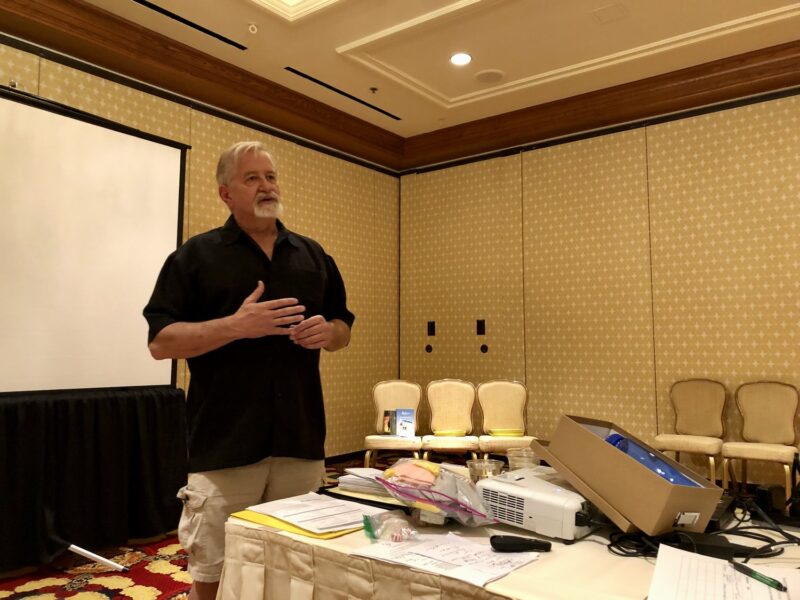Wyoming Records New High for Suicide Rate for 2021 as the State Navigates 24/7 Suicide Hotline Coverage
Mental health advocate looks for sustainable means of funding around-the-clock services
- Published In: Other News & Features
- Last Updated: Sep 29, 2022

Dan "Danno" Hedrick, a grief support coordinator for the Grace for 2 Brothers Foundation, speaks about LOSS (Local Outreach to Suicide Survivors) teams who visit the scene of a suicide to support those left behind at the Wyoming Suicide Prevention Symposium in Cheyenne. Hedrick lost his younger brother, David, to suicide. (Wyoming Truth photo by Shen Wu Tan)
By Shen Wu Tan
Special to the Wyoming Truth
As mental health advocates ramp up their suicide prevention efforts, Wyoming’s suicide rate hit a record high last year, new preliminary data illustrates,
The state saw 189 suicides, or 32.8 suicides per 100,000 individuals, in 2021, data provided to the Wyoming Truth shows – the most reported since 2004 when the state health department started publishing data and more than double the nationwide rate of 13.5 suicides per 100,000 people. The 2021 suicide rate is up from the 30.6 rate recorded by the health department for 2020.
“I think from all of the data we’ve been receiving from various groups, organizations, I would say it was going to almost be expected that there was going to be a rise [in suicides] sadly because of COVID and isolation, the financial situation that people have found themselves in,” said Karen Sylvester, director of projects and training for Wyoming LifeLine, a suicide hotline call center.
“I think in Wyoming when things are good, they’re really good, and then the bottom can fall out really quickly,” she added. “And it bounces all over the place, and I think that is hard on people’s mental health and on relationships sometimes. And sadly, that reflects in those ugly numbers that we see sometimes.”
Seventy-two percent of people took their lives using firearms, while about 22% died by hanging and nearly 4% from poisoning, according to the data from the Wyoming Department of Health. Out of the 13 of 23 counties that reported suicide rates, Platte County reported the highest with 80.5 deaths per 100,000 people. Teton County recorded the lowest suicide rate of 16.6 deaths per 100,000 individuals.
“We’ve got to do better,” said Dan (“Danno”) Hedrick, a grief support coordinator for the Grace for 2 Brothers Foundation, a suicide prevention nonprofit, who lost his younger brother, David, to suicide in December 2011. “It’s a hard road.”
“I just think there’s a lot of people out there who need help through a counselor, psychiatrist, or whoever, and we don’t have enough people to give it to them,” he added before his presentation at the Wyoming Suicide Prevention Symposium in Cheyenne on Tuesday. “And the stopgap things just aren’t working.”

The Wyoming Department of Health is currently reviewing proposals from organizations seeking to tap into the $2.1 million in one-time American Rescue Plan Act (ARPA) funds for suicide lifeline services. The department expects to award funding in either October or November. Gov. Mark Gordon passed legislation in March allocating these funds for 24/7 suicide prevention services in the state.
Wyoming expanded its in-state suicide hotline services to 24/7 coverage in July in preparation for the rollout of 988, the new national suicide and crisis hotline number. Two of Wyoming’s suicide call centers, Wyoming LifeLine in Greybull and the Central Wyoming Counseling Center in Casper, received $60,000 each in federal funding to expand their hotline services.
The federal funding allowed both call centers to add two more hours of coverage and for Wyoming LifeLine to hire another staff member, Ralph Nieder-Westermann, president and executive director of Wyoming LifeLine, previously told the Wyoming Truth. Wyoming LifeLine now covers calls from 2 a.m. to 4 p.m.; the Central Wyoming Counseling Center takes calls from 4 p.m. to 2 a.m. Both call centers also have applied for ARPA funding.
“Together as communities we can make a difference, we can get the resources,” said Gordon, addressing the crowd at the symposium on Monday. “We can work on ways to be able to make a difference…To have our 988 number, to have it 24/7, to understand that we have people now willing in Wyoming that can talk about your community, your needs, your experiences who maybe knows something about your particular sets of issues, that is progress.”
“The difference is cowboy up, pull on your boots and talk about it, not cowboy up and be a strong, silent type,” he added.
Kim Deti, spokesperson for the Wyoming Department of Health, said the department will likely contract with a vendor or vendors who are awarded the ARPA funds when its review period is over. She said the funding will be for services that will likely last for at least two years.
“The idea is to use the ARPA funding as wisely as possible,” Deti said. “At the Wyoming Department of Health, we are working to make the most of the funding for suicide prevention that has become available through ARPA….We always work to make the most of any funding that is available. whether it is through federal grants, special federal funding opportunities, such as ARPA or through appropriations approved by state policymakers. New or additional state appropriations must be approved by policymakers.”
Andi Summerville, executive director of the Wyoming Association of Mental Health and Substance Abuse Centers, is working with lawmakers to determine a sustainable means of funding around-the-clock lifeline services.
Summerville presented a proposal to the revenue interim committee in Casper that would install a fee on a telephone bill for lifeline services or create a trust fund for 988. She told the Wyoming Truth that the committee scratched the phone fee idea but decided to draft a bill establishing the trust fund. The committee is set to hear the draft bill at a November meeting.
If the committee decides to sponsor the bill, then it can be introduced during the upcoming 2023 legislative session.
“When we asked the legislature for the $2.1 million in ARPA funding, this is why: we knew we needed some time to figure out a sustainable revenue source for 988 and the correlating services that go with that,” Summerville said. “So, the ARPA money was never intended to be a long-term fix. It’s a patch. It’s a band aid to get us two years of service, to start to build that service while we work with the state to figure out what that sustainable revenue looks like.”
She added, “This is a critical service to Wyoming…this is not just a mental health crisis. It’s a workforce crisis. It’s a family crisis. It’s a community crisis because these deaths have significant impacts on the state.”
Wyoming was the only state without a suicide lifeline call center until 2020, when the state legislature appropriated about $400,000 for two years to launch the Central Wyoming Counseling Center. The other call center, Wyoming LifeLine, opened shortly afterward. Before these two call centers, out-of-state suicide call centers picked up all calls from Wyoming.













